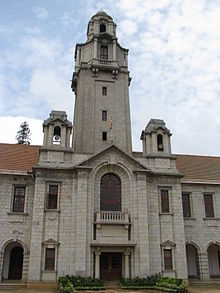
The Indian Institute of Science (IISc) is a public, deemed, research university for higher education and research in science, engineering, design, and management. It is located in the southern Indian city of Bangalore, Karnataka. The institute was established in 1909 with active support from Jamsetji Tata and thus is also locally known as the Tata Institute. It was granted a deemed university status in 1958 and recognized as an Institute of Eminence in 2018.
Shenoy is a surname from coastal Karnataka and Goa in India. It is found among Hindus of the Goud Saraswat Brahmin community following Smartha Sampradaya of Kavale Matha or Madhva Sampradaya of either Gokarna Matha or Kashi Matha.

Vinod K. Singh is a Rahula and Namita Gautam Chair Professor of Chemistry at IIT Kanpur. He is also the Director's Chair Professor at IISER Bhopal & adjunct professor at NIPER Hyderabad. He is currently the President, Chemical Research Society of India and the Chairman, Governing Council of IACS Kolkata.
Chetan Eknath Chitnis is an Indian scientist in the field of malaria research. He is the head of the Malaria Parasite Biology and Vaccines Unit at the Institut Pasteur in Paris and an elected fellow of the Indian Academy of Sciences (2009) as well as Indian National Science Academy (2014). He received the Shanti Swaroop Bhatnagar Award in 2004 and the Infosys Prize in Life Sciences 2010. Chitnis is the former principal investigator of the malaria research group at the International Centre for Genetic Engineering and Biotechnology (ICGEB) in New Delhi.
Roop Mallik is an Indian biophysicist who works on nanoscale molecular motor proteins that transport material such as viruses, mitochondria, endosomes etc. inside living cells. The motors, such as kinesin and dynein generate forces of pico-newton order to carry our various cellular processes namely cell division, vesicular transport, endocytosis, molecular tethering etc. His lab is working to understand how motor proteins help in degradation and clearance of pathogens, and also how these motors work inside the liver to maintain systemic lipid homeostasis in the animal. Mallik is currently a professor at the Department of Biosciences and Bioengineering, Indian Institute of Technology Bombay.

Sachchida Nand Tripathi an Indian scientist who works in the field of Atmospheric Sciences is the inaugural Dean of Kotak School of Sustainability at Indian Institute of Technology, Kanpur and Professor in the Department of Civil Engineering and jointly with the Department of Sustainable Energy Engineering. Prof. Tripathi has recently been honored with the prestigious Alexander von Humboldt Medal 2024, given in recognition for conducting exceptional research in developing regions. In the past decade, Prof. Tripathi has undertaken seminal work in developing state-of-the-art air quality monitoring and management technologies in India. He is credited with implementing the first large-scale dense real-time sensor-based air quality network across two largest states located in the IGP region in India, which has encouraged several Urban Local Bodies (ULBs) to adopt this technology for improving decision making. His work has directly impacted policy making at the national level, while continuing to guide over 25 Ph.D. thesis and mentored several successful startups who have gone on to become market leaders. Prof. Tripathi’s broad area of work in atmospheric sciences includes aerosol-induced cloud invigoration effect, regional climate changes, AI/ML-enabled dynamic hyper-local source apportionment and low-cost sensor-based air quality monitoring. He is leading an international center of Excellence on Advanced Technologies for Monitoring Air quality iNdicator (ATMAN) under the aegis of Principal Scientific Adviser’s office to Government of India. Prof. Tripathi is the Project Director of the “AI Centre of Excellence (AI-CoE) for Sustainable Cities,” an MoE initiative under the mission "Make AI in India, Make AI Work for India." The project focuses on scalable solutions for energy forecasting and logistic planning, digital twin for urban mobility, air quality monitoring and spike detection of pollution episodes, flood management, and smart microgrid planning, involving consortium of leading Higher Education Institutes in India and diverse industry partners to achieve optimal urban governance. In recognition of his significant contributions, Prof. Tripathi has been honoured with numerous awards in Physical Science as well as in Engineering. He is the recipient of Shanti Swarup Bhatnagar Award, J. C. Bose Fellowship and Infosys Prize 2023 in Engineering and Computer Science. He is an elected fellow of the Indian National Science Academy (INSA), Indian National Academy of Engineering (INAE) and National Academy of Sciences of India (NASI), and recipient of the Distinguished Alumnus award of Banaras Hindu University. He also holds the Sir M. Visvesvaraya Chair Professorship at IIT Kanpur. He obtained his B. Tech from IIT BHU in Civil Engineering in 1992 and Ph.D. in Atmospheric Physics from University of Reading, UK in 2001. After a brief stint of post-doctoral research at Bhabha Atomic Research Centre and University of Oxford, Prof. Tripathi joined IIT Kanpur as faculty in 2003.
Kaushal Kumar Verma is an Indian mathematician who specializes in complex analysis. He earned a B.Tech degree in engineering physics from IIT Bombay in 1992. He then obtained a PhD in mathematics from Indiana University Bloomington, and also worked at Syracuse University for a year, followed by working at the University of Michigan, Ann Arbor, for 3 years. He was awarded the Shanti Swarup Bhatnagar Prize in 2014. He is a mathematics professor and dean of mathematical and physical sciences at Indian Institute of Science, Bangalore.

Naveen Garg is a Professor of Computer Science in Indian Institute of Technology Delhi, specializing in algorithms and complexity in theoretical computer science. He was awarded the Shanti Swarup Bhatnagar Prize for Science and Technology, India's highest prize for excellence in science, mathematics and technology, in the mathematical sciences category in the year 2016. Naveen Garg's contributions are primarily in the design and analysis of approximation algorithms for NP-hard combinatorial optimization problems arising in network design, scheduling, routing, facility location etc.

Man Mohan Suri (1928–1981) was an Indian mechanical engineer and the Director of Central Mechanical Engineering Research Institute (CMERI), Durgapur. He is best known for inventing Suri Transmission, a hydromechanical transmission unit, reported to increase the efficiency of diesel locomotives and he held the patent for the inventions. The technology is known to have led to 36 patent specifications in eleven countries. He is also credited with the conceptualization of Swaraj farm tractor, a product of Punjab Tractors Ltd. and held another patent for his development of Railway truck wheel assembly. He received the fourth highest Indian civilian award of the Padma Shri in 1961. The Council of Scientific and Industrial Research, the apex agency of the Government of India for scientific research, awarded him the Shanti Swarup Bhatnagar Prize for Science and Technology, one of the highest Indian science awards for his contributions to Engineering Sciences in 1962. The Indian Institute of Technology, Delhi has instituted an annual award, Padmashri Manmohan Suri Project Award, for honoring the best mechanical project by its alumni.

Anurag Sharma is an Indian physicist and a professor at the department of physics of the Indian Institute of Technology Delhi. He is known for his pioneering researches on optoelectronics and optical communications and is an elected fellow of all the three major Indian science academies viz. Indian Academy of Sciences, Indian National Science Academy and National Academy of Sciences, India as well as Indian National Academy of Engineering. The Council of Scientific and Industrial Research, the apex agency of the Government of India for scientific research, awarded him the Shanti Swarup Bhatnagar Prize for Science and Technology, one of the highest Indian science awards for his contributions to Engineering Sciences in 1998.
Kehar Singh is an Indian optical physicist and an emeritus fellow of the Indian Institute of Technology, Delhi. He is a former CLUSTER chair professor at Swiss Federal Institute of Technology in Lausanne and a former professor of IIT Delhi. He has also served as an academic visitor at Imperial College of Science and Technology, London.

Deepak Kumar was an Indian condensed matter physicist and a professor at the School of Physical Sciences of Jawaharlal Nehru University. Known for his research on quantum mechanics and other areas of condensed matter physics, Kumar was an elected fellow of the Indian Academy of Sciences. The Council of Scientific and Industrial Research, the apex agency of the Government of India for scientific research, awarded him the Shanti Swarup Bhatnagar Prize for Science and Technology, one of the highest Indian science awards, for his contributions to physical sciences in 1988.
Vikram Kumar is an Indian material physicist, academic and an emeritus fellow of the Indian Institute of Technology, Delhi. He is a former director of the Sold State Physics Laboratory of IIT Delhi and is known for his studies on semiconductor technology. He has worked on ultra thin oxide MOS structures, silicon, III-V and II—VI semiconductors which is reported to have assisted in understanding their characterization. The Council of Scientific and Industrial Research, the apex agency of the Government of India for scientific research, awarded him the Shanti Swarup Bhatnagar Prize for Science and Technology, one of the highest Indian science awards, for his contributions to physical sciences in 1992. He is also a recipient of the Distinguished Materials Scientist of the Year award of the Materials Research Society of India. In 2019, he inaugurated, with colleagues, the Aryabhatt Auditorium at the “Prof. Rajendra Singh Institute of Physical Sciences for Study and Research" at the Veer Bahadur Singh Purvanchal University of Jaunpur.
Subodh Raghunath Shenoy is an Indian condensed matter physicist and a former professor at the Tata Institute of Fundamental Research. He has also been associated with the Indian Institute of Science Education and Research, Thiruvananthapuram. Known for his studies on Condensed matter physics and Statistical physics, his research covered topological defect-mediated phase transitions, vortex dynamics and decay kinetics of metastability.
Madan Rao is an Indian condensed matter and biological physicist and a senior professor at National Centre for Biological Sciences. Known for his research on molecular dynamics on cell surface, Rao is an elected fellow of the Indian Academy of Sciences and the Indian National Science Academy. The Council of Scientific and Industrial Research, the apex agency of the Government of India for scientific research, awarded him the Shanti Swarup Bhatnagar Prize for Science and Technology, one of the highest Indian science awards, for his contributions to physical sciences in 2004.
Ganpathi Naresh Patwari is an Indian chemist and a professor at the Department of Chemistry of the Indian Institute of Technology Bombay. Known for his studies on vibrational spectroscopy, his work is reported to have widened the understanding of the fundamental concepts in hydrogen bonding.

The University College of Science, Technology and Agriculture are two of five main campuses of the University of Calcutta (CU). The college served as the cradle of Indian sciences by winning the Nobel Prize in Physics in 1930 and many fellowships of the Royal Society London.
Shankar Ghosh is an Indian physicist, currently associated at the Department of Condensed Matter Physics and Material Science, Tata Institute of Fundamental Research. He is known for his research on experimental condensed matter physics. The Council of Scientific and Industrial Research, the apex agency of the Government of India for scientific research, awarded him the Shanti Swarup Bhatnagar Prize for Science and Technology for his contributions to physical sciences in 2019.
Debdeep Mukhopadhyay is an Indian cryptographer and professor at the Department of Computer Science and Engineering of the Indian Institute of Technology Kharagpur. He was awarded the Shanti Swarup Bhatnagar Award for Science and Technology, the highest science award in India, in 2021 for his contributions to micro-architectural security and cryptographic engineering. Debdeep Mukhopadhyay's research interests include Hardware security, Cryptographic Engineering, Design Automation of Cryptosystems, VLSI of Cryptosystems, and Cryptography. He has authored several textbooks, including Cryptography and network security, which has been cited 1227 times, according to Google Scholar. He was elevated to the Fellow of Indian National Academy of Engineers in 2021.








